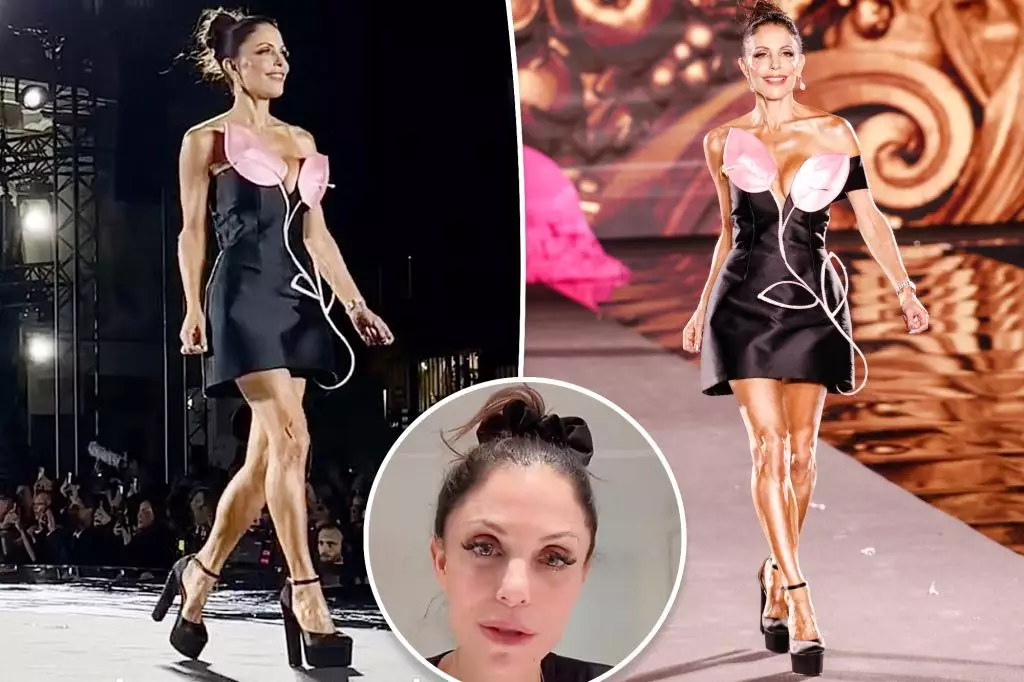Bethenny Frankel, business mogul and former star of “The Real Housewives of New York City,” recently made her runway debut at the L’Oréal Paris Fashion Show, marking a significant moment in her ongoing journey of self-expression. However, what should have been a celebration of diversity and individuality quickly turned into a platform for public scrutiny. Though individuals like Frankel work to embrace their authenticity, audiences often have a mixed response that tends to favor conventional standards of beauty and performance.
Frankel’s runway presentation, characterized by a striking ensemble of high black platform heels and a strapless minidress adorned with pink floral appliqués, was colorful and bold. However, her approach to walking down the runway—a perceived “march”—evoked confusion and criticism among social media viewers. Comments ranged from concerns over the heaviness of her footwear to outright statements about her lack of grace. Comments such as “What’s with the marching?” and “You seem uncomfortable,” reveal an audience navigating between admiration for Frankel’s bravery and a more traditional expectation of runway poise.
It’s important to analyze this behavior not merely as critique but as a larger commentary on societal standards for women in the public eye. As seen with Frankel, even in moments designed for empowerment and individuality, the social media landscape can shift quickly to amplify potential flaws, seeking to hold public figures to rigid standards of performance and beauty.
In a striking response to her haters, Frankel defended her performance with an admirable level of self-acceptance. Despite acknowledging the discomfort of being “completely” out of her element, she took pride in her unique approach to walking the runway, aiming to embody elongated grace akin to a “giraffe.” Her explanation reveals a deeper theme: the power of embracing imperfection and the importance of authenticity in self-presentation. Frankel highlighted that the essence of her performance, and indeed the fashion show itself, lay in celebrating individuality rather than adhering to uninspired standards of “perfection.”
This belief reflects a broader cultural shift towards accepting and celebrating one’s self, flaws included. In her words, she emphasized the value of doing what one wants, rather than seeking validation through others’ expectations. This attitude resonates with many individuals who have faced criticism for their unconventional choices in a society that often lauds conformity over authenticity.
While Frankel garnered criticism, it’s noteworthy that many in her circle—including fans—rallied behind her. Affirmative comments flooded her social media, with words of encouragement and appreciation for her vibrant spirit. Phrases like “You CRUSHED it!” and “It looked like it was totally your element!” underscored the existing community that celebrates diversity in self-expression. This juxtaposition of harsh public criticism and supportive validation serves as a reminder of the divided perceptions that individuals face in the limelight.
Furthermore, in sharing her experience, Frankel has opened a dialogue about confidence and allowing oneself to experience joy despite societal norms. The varying perspectives surrounding her runway walk highlight the challenge of balancing self-expression with societal expectations, a duality that many individuals encounter daily.
Frankel’s trajectory emphasizes a need for dialogue regarding authenticity in a celebrity-driven culture. The reality TV star’s candid approach not only marked a personal victory for her but also advocated for a broader acceptance of self-expression in all forms. As more public figures embrace their quirks and imperfections, audiences are encouraged to reconsider the arbitrary rules that often govern perception and evaluation.
In the end, Bethenny Frankel’s unique runway experience highlights an essential narrative: even among judgment and critique, the triumph of confidence and individuality can shine brighter. Encouraging an embrace of authenticity may begin with moments like Frankel’s—celebrating the imperfect beauty of being unapologetically one’s self, marching to the sound of their own drum.

Leave a Reply